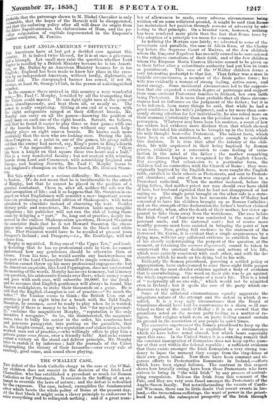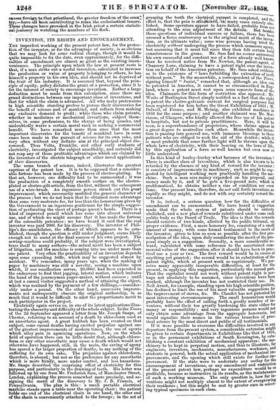THE O'MALLEY CASE.
THE defeat of the Irish Catholic clergy in the ease of the O'Mal- ley children does not consist in the decision of the Irish Lord Chancellor, who has established a precedent as much for Roman ðos as for Protestants. It consists in the baffling of an at- ,teniPt to override the laws of nature ; and the defeat is redoubled D3' the exposure. The case, indeed, exemplifies the fundamental error which besets the whole policy of Rome at the present day. at the first blush it might seem a clever principle to endeavour to seize everything and to relinquish nothing ; and if a great num-
ber of allowances be made, every adverse eircumstaiseeeheing. written off on. some collateral ground, it might be said that.dienew has maintained her position through seasons of adversity brakelsne hering to that principle. On a broader view, however, nothing has been rendered more plain than the fact that Rome loses by this adoptioa of a principle too mean for commerce. In noticing the Mortara case lately, we adverted to some of the precedents and parallels, the ease of Alicia Race, of the Chetty. boy before the Supreme Court of Madras, of the Jew children whom the Emperor Napoleon has recently caused to be surrendered. to the religious custodians of their faith, and of the Jew children whom the Empress Maria Theresa likewise caused to be given up to their father after a subordinate authority had put him in irons as punishment. This case of the O'Malley children forms a very interesting postscript to that list. That inther was a man in humble circumstances, a member of the Irish police force; his wife was evidently a woman of strong feeling, active sense, and moral energy. Some incidental circumstance led to the supposi- tion that she expected a certain degree of patronage and-support from some eminent Protestant families in Ireland, her own faith being Protestant. It is more than probable that all these circum- stances had an influence on the judgment of the father ; but it is to be inferred, from many things he said, that while he had a great confidence in his wife's judgment, and a far more than com- monly strong affection for her individually, he also relied more on their common Christianity than on the peculiar tenets of his own persuasion. Whatever may have been his motives, a court of law has seldom had evidence more distinct than that which showed that he intended his children to be brought up in the faith which
his wife thought best—the Protestant. The salient facts, which.
have been so often mentioned, are quite enough to establish this decision. It is true that after the infancy of the chil- dren, his wife acquiesced in their being baptised by Roman priests, evidently as a concession to some feeling of satis- faction in the mind of the father ; the mother remarking that the Roman baptism is recognized by the English Church. But excepting that submission to a particular form, the children had no connection with the Church of Rome ; they were originally baptised by the English form, were taught the English faith, enrolled in their schools as Protestants, and sent to Protest- ant churches ; and one of them was engaged as chorister in a
Protestant cathedral. -When the mother declared, before the
dying father, that neither priest nor nun should ever have child of hers, her husband signified that he had not disapproved of her saying so. The single point brought on the other side is a state- ment by a priest, that in his last moments John O'Malley had consented to have his children brought up as Roman Catholics ; and on the strength of this declaration the father's brother claimed their custody, when, after the death of their mother, her sister ap- peared to take them away from the workhouse. The ease before the Irish Court of Chancery was conducted in the manic of the paternal uncle, and the maternal aunt ; but of course more wealthy persons must have assisted in bringing the point of law to an issue. Now, giving full credence to the statement of the Reverend Mr. Coyne, it is evident that a single acquiescence by a dying man, without any collateral evidence to establish the feet
of his clearly understanding the purport of the question at the moment, or retaining the animus disponendi, cannot be taken to countervail the constant declarations and actions of his life, which were entirely consistent with each other, and with the de- clarations which he made on his dying bed to his wife.
Evidently the Roman priesthood, pursuing a settled policy of appropriation, have endeavoured to seize these eight little pauper children on the most slender evidence against a body of evidence that is overwhelming. One word on their side was to go against the whole expressions and actions of a man's life. This is a kind of "reciprocity all on one side," which would not be admitted even in Ireland ; but it spoils the case of the party which en- deavours to rely upon it.
Some of the collateral circumstances equally aggravate the iniquitous nature of the attempt and the defeat in which it re-
sulted. It is a very ugly circumstance that the Board of Guardians should have lent its countenance to a claim so ill sus- tained as that of the uncle O'Malley ; it is an avowal that the guardians acted on the merest party feeling in a matter of re- ligion. But religion which rests on party feeling cannot sustain its ground in the conviction of any people in quiet times. The excessive eagerness of the Roman priesthood to keep up the Papist population in Ireland is explained by a circumstance which we have before noted abroad, but which bears especially upon this ease. In the United States it is a standing remark that the constant immigration of Romanists does not keep up the num- ber of that sect within the federal republic ; a sufficient evidence that there exists amongst the Irish Romanists a very strong ten- dency to lapse the moment they escape from the ring-fence of their own green island. Now there have been constant and vi- gorous efforts to Protestantize Romanists iu Ireland,—efforts which have been signal failures. The contrast in this respect shows how brutally erring have been those Protestants who have striven to bring in "the wild Irish" by any process of central- izing compulsion. Release the Irish from this remnant of the Pale, and they are very soon fused amongst the Protestants of the Anglo-Saxon family. But notwithstanding the vaunts of Cardi- nal Wiseman, there can be little doubt that recent events in Ire- land,—the tremendous sufferings, the want of power in the priest- hood to assist, the subsequent prosperity of the Irish through
causes fereiffnihalthntrneienthooil, the greater freedom of the emu; tryn-e-have all hnen contributing Ae relax the ecclesiastical tenure. These changes hav& provoked in the Irish priest a certain statisti- ealjealousy,in watching the numbers of his flock.



























 Previous page
Previous page